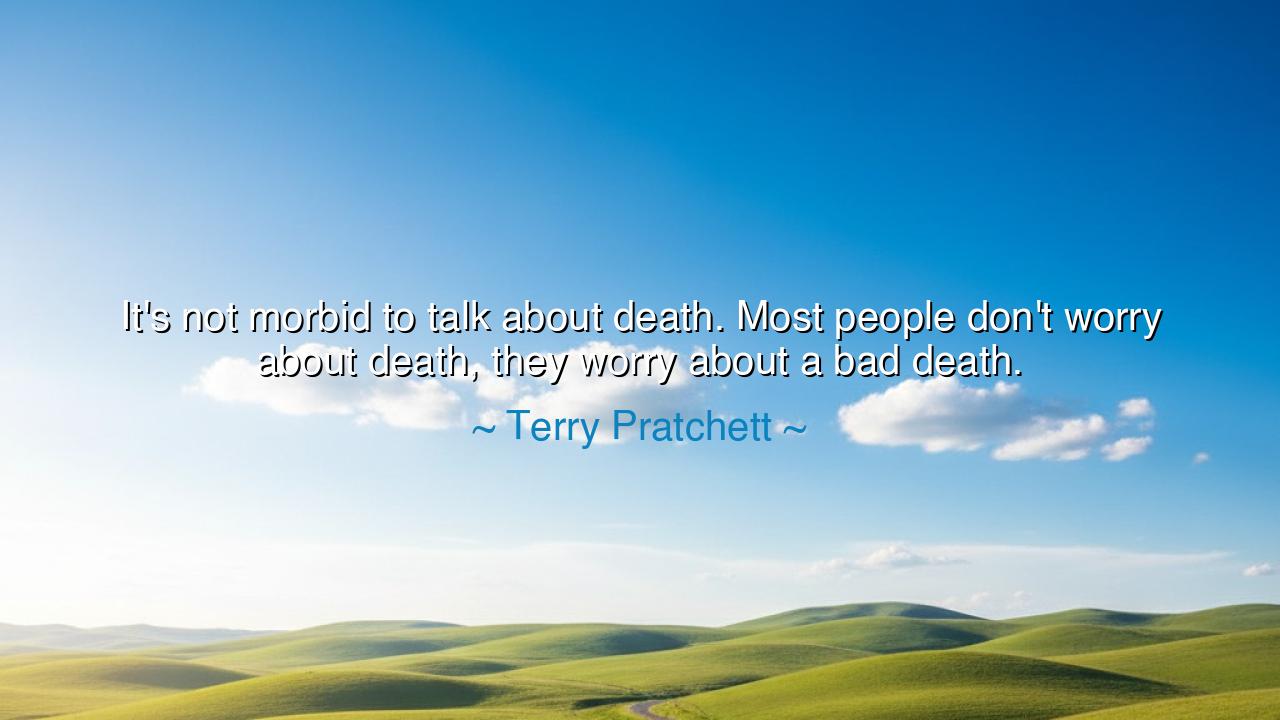
It's not morbid to talk about death. Most people don't worry
It's not morbid to talk about death. Most people don't worry about death, they worry about a bad death.






When Terry Pratchett wrote, “It’s not morbid to talk about death. Most people don’t worry about death, they worry about a bad death,” he was not merely speaking as a storyteller, but as one who had stared into the mystery himself. These words were born of both wisdom and courage, uttered by a man who, in the final years of his life, faced the slow dimming of his mind under the weight of Alzheimer’s disease. He refused to let silence, denial, or fear dictate the conversation about mortality. Instead, he invited the world to speak openly, honestly, and even humorously about the inevitable. For to speak of death, he taught, is not morbid — it is human, and it is liberating.
The origin of this quote can be traced to Pratchett’s later years, when he became an advocate for the right to die with dignity. A master of satire and wit, he used the power of story to confront what most prefer to ignore. In his beloved Discworld novels, Death himself walks among mortals — not as a terror, but as a companion, courteous and calm, carrying both scythe and sympathy. Through this character, Pratchett reminded readers that death is not the villain of existence; it is simply part of the tale. What humans truly fear, he observed, is not the end itself, but the manner of the ending — pain, indignity, helplessness, or the slow fading of self. It is not death that haunts us, but the loss of meaning before it.
In truth, this insight is as old as the ages. The ancient philosophers of Greece and Rome, from Socrates to Seneca, spoke freely of death and called it the final teacher. They did not avoid it in conversation or thought; they embraced it as a mirror that clarifies life’s true purpose. “To philosophize is to learn how to die,” said Montaigne centuries later, echoing the ancients. To talk about death is not to invite doom, but to prepare the spirit for serenity. Pratchett stood within this timeless lineage — the lineage of those who understand that silence breeds fear, while speech brings understanding and peace. He gave death a voice, so that men and women might learn to greet it as a neighbor, not a thief.
Yet he did not glorify death, nor call it sweet or noble. Rather, he recognized the sacred difference between dying well and dying poorly. A “bad death,” in his words, is one robbed of choice, of dignity, of peace. It is the death of those who suffer unnecessarily because society is too afraid to speak of mortality, to plan for it, to honor it as a part of life. A “good death,” by contrast, is not about ease or luxury — it is about control, acceptance, and meaning. It is the quiet passing of one who has made peace with his journey, who has spoken his truth, loved deeply, and faced the end not with denial, but with grace.
History gives us luminous examples of this wisdom in action. Consider Socrates, who, when sentenced to die, spoke calmly to his disciples and drank the hemlock without trembling. To him, death was simply the next step in the journey of the soul — unknown, perhaps, but not to be feared. Or think of Leonardo da Vinci, who, on his deathbed, whispered, “I have offended God and mankind because my work did not reach the quality it should have.” These were not men who fled from death; they met it as they met life — with awareness and reflection. Their deaths were good deaths because they were conscious ones, lived fully to the end.
Pratchett himself lived and wrote in this spirit. Even as illness stole his words, he continued to speak of life and death with humor and dignity. He advocated that every person should have the right to choose their own exit when the time comes — to die as they had lived: with self-respect and intention. His words remind us that fear fades when we face it, and that by speaking of death, we reclaim power over it. What we cannot name, rules us; what we name, we understand.
So, take this lesson, child of time: do not whisper about death as though it were shameful. Speak of it, learn from it, and prepare your spirit for its coming. For in talking about death, you will learn how to live more vividly — to value each sunrise, each touch, each word left unsaid. Do not fear the end; fear only the life half-lived, the love withheld, the truth unspoken. When you meet death, let it find you ready, not as a victim, but as a friend — one who has already embraced the whole of existence. For as Terry Pratchett showed the world, it is not death that makes life tragic, but the failure to live and die with courage, clarity, and peace.






AAdministratorAdministrator
Welcome, honored guests. Please leave a comment, we will respond soon